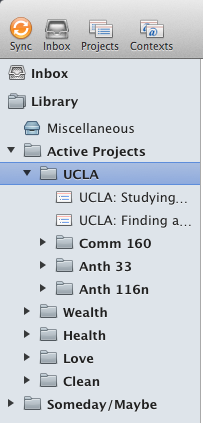Hi!
I'm trying to figure out how i should organize my next actions and project list in college. I usually do homework either at school or at home. It doesn't really matter where i do it, depends more on what books/school supplies i have with me. I use Remember the milk to organize my setup.
Here is an example from one of my courses:
Course #1
- read page 10-20 in book (NA)
- review notes from class (NA)
- written assignment (Project)
*read page 11-39 (NA)
*write a report
*send report to a fellow student
- waiting on test to get graded (Wait)
Should i treat each course as a project? If i should, what do I do with projects within the different courses? What contexts should i use?
I know this might be unclear, so please ask if there are any questions.
I'm trying to figure out how i should organize my next actions and project list in college. I usually do homework either at school or at home. It doesn't really matter where i do it, depends more on what books/school supplies i have with me. I use Remember the milk to organize my setup.
Here is an example from one of my courses:
Course #1
- read page 10-20 in book (NA)
- review notes from class (NA)
- written assignment (Project)
*read page 11-39 (NA)
*write a report
*send report to a fellow student
- waiting on test to get graded (Wait)
Should i treat each course as a project? If i should, what do I do with projects within the different courses? What contexts should i use?
I know this might be unclear, so please ask if there are any questions.



